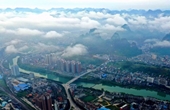Tourism
By (chinadaily.com.cn)
2018-08-27
Hechi has plenty of tourist resources that are waiting to be developed, from its magnificent karst formations and mountains and rivers, to its lakes and colorful primeval forests, to its culture and folk customs.
There are more than 60 scenic spots here and four more in the works - the Yizhou tourist zone, which includes the city of Yizhou and Luocheng Mulam autonomous county; Hechi tourist zone, with its Jinchengjiang district and Nandan and Huanjiang counties; Hongshui River reservoir zone, with Dahua, Bama, Donglan and Tian’e counties; and the Panyang River longevity tourist zone, with Dongbafeng county.
Yizhou’s Xiajian village is said to be the home of the legendary Liu Sanjie, a singer, and draws in countless visitors every year. It has unique mountains and water as well as secluded caves and beautiful stones and was regarded the uncrowned king of scenery by early and modern tourists. Major scenic spots include the picturesque Xiajian River, Xiannv (Fairy) Rock with its caves and water, magnificent Bailong Cave with its mystical veil, and Jianjiang River with its towering peaks and cascading waterfalls.
Yizhou and Luocheng’s mountains are tall and upright and have multiple forms and there are karst caves with dainty, colorful life-like stalactites. These caves, mountains, water, stones, bamboo, lakes, waterfalls, peaks, and rivers are all part of a gorgeous landscape.
Hechi was an important part of China’s Youjiang revolutionary base with many revolutionists leaving their marks here, such as Deng Xiaoping, Zhang Yunyi, Wei Baqun, and Li Mingrui.
Many sites are now tourist attractions, such as Kuixing Tower in Donglan county, which was a work site for the Red Army’s front committee and Donglan revolutionary committee; or Lenin Rock, which was a Peasant Movement National Institute; or Longjing village, a base for the Red Army’s 21st Division; Xiangshua Cave, where Wei Baqun gave his life; the old site of the Red Army’s Camp 7; or Donglan Cemetery for martyrs of the revolution. These historic spots are worth a fortune for teaching the young about our revolutionary tradition and are valuable tourism resources as well.
Yizhou also has many inscriptions on precipices as part of its heritage, with 60 magnificent ones in Bailong caves. Then, there is the Shangu Temple, Longyin Rocks, Changshou Bridge, Jiuru Han Dynasty tombs and Xiangshan Temple, of major historic value, in Yizhou, Luocheng and Donglan. These are also valuable tourism resources and contain information on past politics, military affairs, the economy, ethnic groups and social conditions. There are also man-made lakes at Liujia, Lalang, Luodong, Dahua and Yantan and scenic areas at Dahua and Yantang.
Chinese and foreign experts have concluded that the Panyang River Basin, including Donglan and Fengshan counties, with Bama Yao autonomous county as the center, is the home of long life, almost 30 people per 100,000 living past 100, and 81 people above the age of 100 who are in good shape.
At the 13th international natural medicine conference in Tokyo, Bama was named the world’s fifth home of longevity. Bama’s long life spans have many things to thank, such as the air, mountains, water, vegetation, livestock, crops, certain foods, and eating habits and folk custom. There is also the Panyang River Basin, home to some rare karst caves, with Baimo Cave being the most famous. Baimo was named the world’s most spectacular cave by a Sino-British expedition, while the ethnic customs have made Bama popular as a resort for health care, sightseeing, and scientific research.
Jiuwan Mountain, the Buliu and Chuandong rivers, and Sanpihu are all nature reserves, each covering more than 50 sq km and home to subtropical plants and interesting animals, with more than 1,000 plant species, including rare species under State protection, such as pseudotsuga brevifolia, fokienia hodginsii and pseudotaxus chienii.
There are hundreds of rare animals, including the South China tiger, civet cat, macaque monkey, and forest musk deer. These nature reserves are ideal places for summer holidays, sightseeing, exploration and scientific research.




